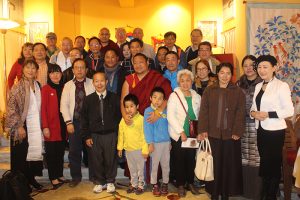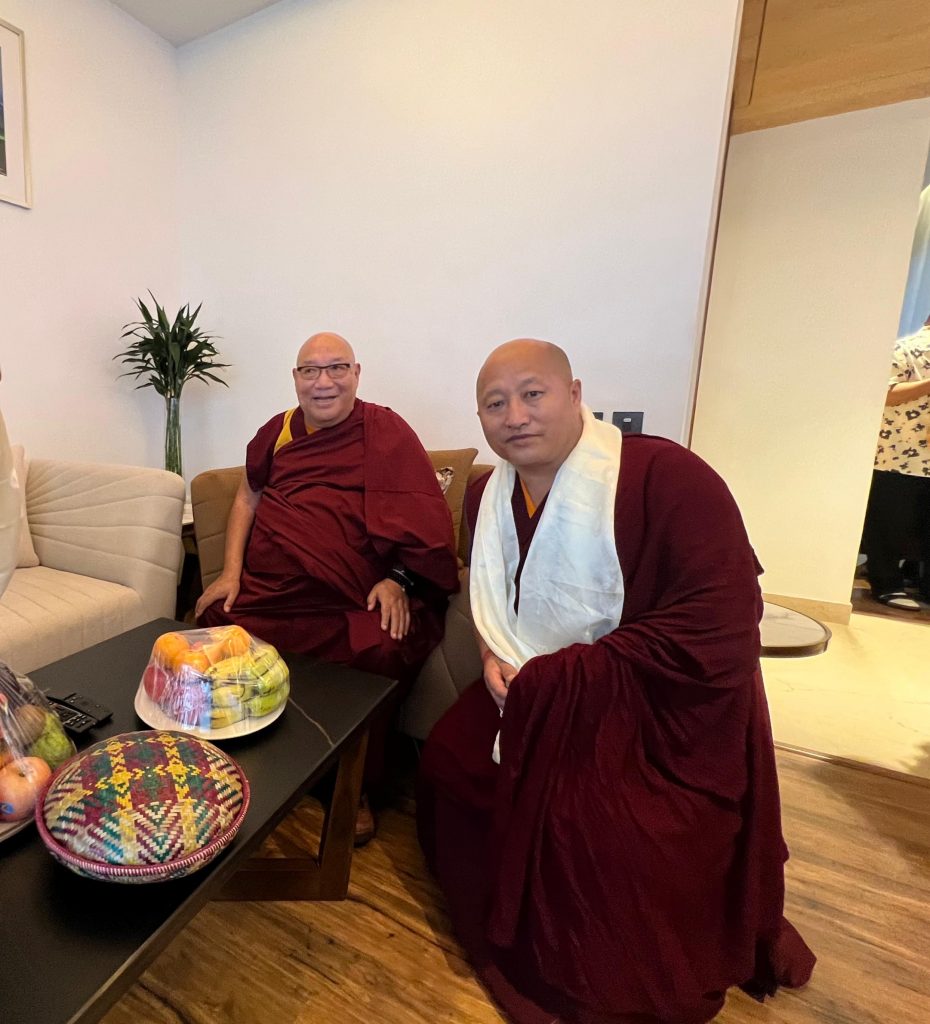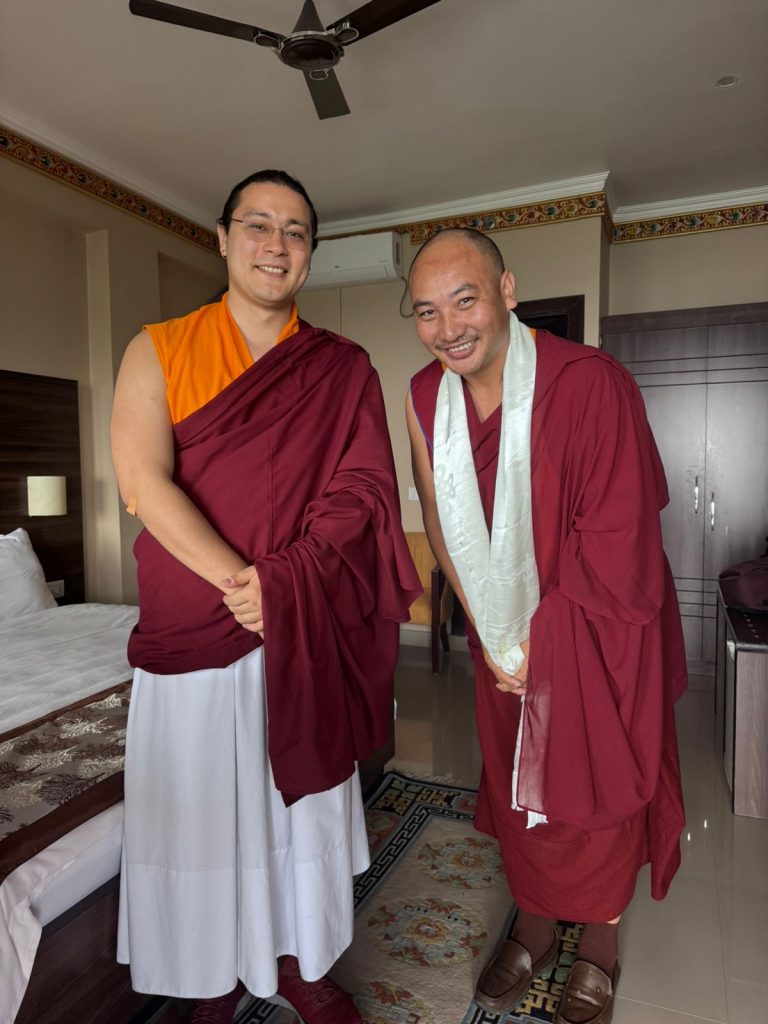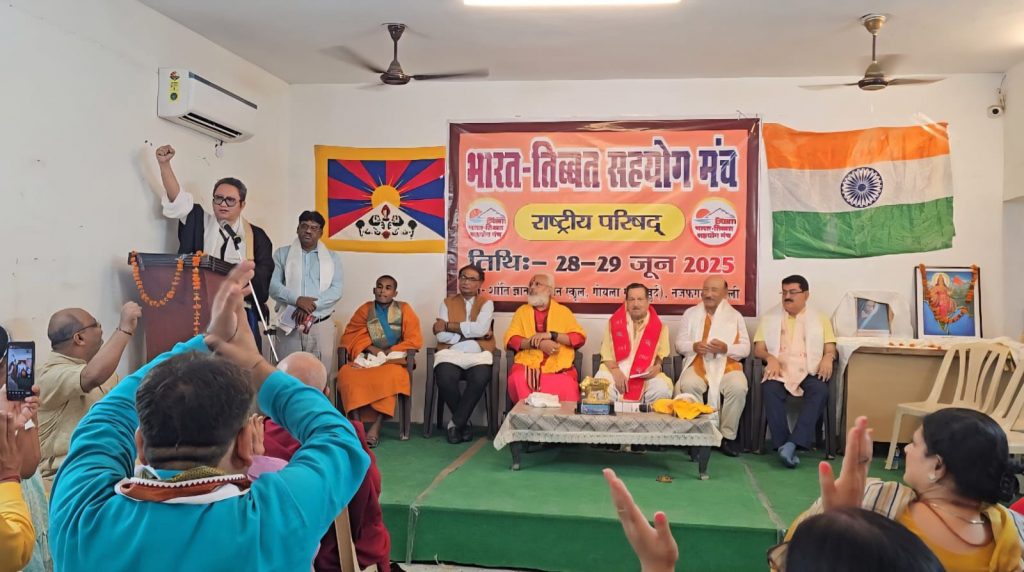Speaker and standing committee memebers with the chinese guests
Dharamsala: Tibetan Parliament-in-Exile hosts dinner for 48 Chinese guests from various countries on 11 March 2019 at Norbulingka, Sidpur, who came to commemorate the 60th Anniversary of the Tibetan National Uprising Day.
Speaker Pema Jungney received them along with standing committee members, Ven. Khenpo Sonam Tenphel, Mrs. Juchen Konchok Choedon, Ven. Geshe Atuk Tsetan and Mr. Karma Gelek.
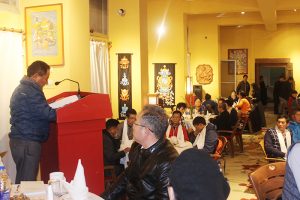 Speaker addressing the dinner hosted at Norbulingka, SIdpur
Speaker addressing the dinner hosted at Norbulingka, SIdpur
At the dinner, Speaker On behalf of the 16th Tibetan Parliament-in-Exile, welcomed all to Dharamsala and express his profound gratitude for coming all the way from their hometown to support us and show solidarity with us on this landmark event in our Tibetan history that is Tibetan National Uprising Day, which marks the 60th Anniversary this year.
He Said “At this time of our struggle towards just cause of Tibet, your presence will contribute and will encourage us towards solving the long lasting issue of Tibet through Middle Way Approach.”
The Communist Party under the name of the People’s Republic of China started their colonial journey into Tibet in 1949 and since then on various types of repression and authoritarianism on Tibetans and Tibet government had been executed and it is still going on. The so-called 17 Point Agreement on 23rd May, 1951 was one such example, wherein the Communist Party of China deliberately compelled the Tibetan delegation led by Ngapo Ngawang Jigme to sign it, which only suffices the demands and interests of the Party itself. This Agreement was signed without the consent of the Tibetan government and was totally signed with full torture and bully. Despite that, Tibetans under the great and privilege leadership of His Holiness the Dalai Lama have approached the Chinese government for a Middle Way Approach seeking for a peaceful solution of Tibet’s issue through dialogue. It bears in mind the realistic interest of both Tibetan and Chinese people. It clearly implies for not seeking independence but a genuine autonomy within the framework of the People’s Republic of China.
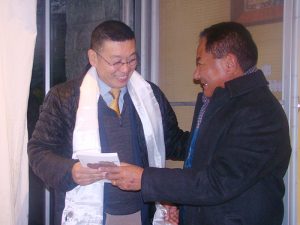 Speaker receiving the guest along with standing committee members
Speaker receiving the guest along with standing committee members
Speaker further stated that, the Central Tibetan Administration and majority of Tibetans are still committed to pursue on this approach with the Chinese government. Until now, we have had 9 rounds of dialogue and that 9th round was held in year 2010. During the eight round of talk in 2008, the two envoys of His Holiness the Dalai Lama presented the Chinese counterparts at their request, a copy of the Memorandum for Genuine Autonomy for the Tibetan People. This memorandum states for the importance of the middle way approach for both China and Tibet but this modest proposal was rejected on account of violating the Chinese constitution. Then during the ninth round of discussions, the two envoys presented to the Central United Front Work Department a note on the memorandum which explained how the demands of the Tibetan people, as articulated in the memorandum, did not violate the Chinese constitution. After this round of dialogue, we didn’t get any positive response from the Chinese government. The Central Tibetan Administration has made every effort within its power to create a conducive atmosphere for negotiations and taken a series of confidence-building measures. The CTA is committed to take these steps till the issue of Tibet is resolved through a negotiated settlement in the best interest of both the Tibetan and Chinese peoples.
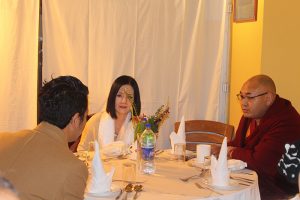 Ven. Khenpo Sonam Tenphel with the guets
Ven. Khenpo Sonam Tenphel with the guets
Speaker also spoke about Chinese scholars, activists, policy experts, journalists and individuals in and outside China, who have expressed their full support through letters, peoms and voices for this approach of the Central Tibetan Administration and called on the Chinese government to resume dialogue with His Holiness the Dalai Lama. Even Nobel Peace Laureate, late Liu Xiaobo supported this policy. The liberal thinking of these Chinese section consider this approach a valuable proposal for solving the long standing issue of Sino-Tibet, promoting reconciliation between China and Tibet.
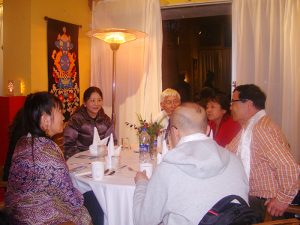 Mrs. Juchen Konchok Choedon with the guests
Mrs. Juchen Konchok Choedon with the guests
Since, there were few Chinese who didn’t understand English and at the request of some Chinese guests. Speaker with a help of an interpreter elucidated on emergence and evolution of democracy in exile, gave introduction and insights of Tibetan Parliament-in-Exile.
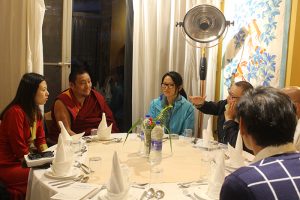 Ven. Geshe Atuk Tsetan with the guests
Ven. Geshe Atuk Tsetan with the guests
Unlike other countries, Tibetan democracy is bestowed to the Tibetans by His Holiness the Dalai Lama. Before 1990s, Tibetan Parliament-in-Exile does n’t function like now, it was called National Working Committee chaired by a Chairman and a vice Chairman. In 1991, the Charter of the Tibetans-in-Exile was adopted and Tibetan Parliament-in-Exile started functioning like today which is very similar to Indian Parliament. In 2011, His Holiness devolved his entire political and administrative authority to the elected Tibetan Leadership and the Charter was amended accordingly.
Finally, Speaker thanked them once again for their solidarity gesture.
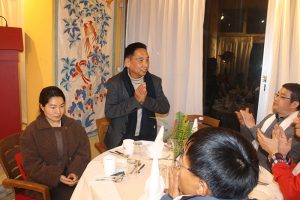 Mr. Karma Gelek introducing himself to the guests
Mr. Karma Gelek introducing himself to the guests
